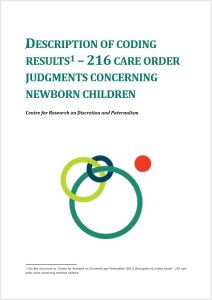Presented in this report are the results of the descriptive coding of care order judgments concerning newborn children collected for the research projects Acceptability of Child Protection Interventions: A Cross-Country Analysis (funded by the Research Council of Norway, grant no. 262773) and Discretion and the Child’s Best Interests in Child Protection (funded by the European Research Council, grant no. 724460).[1]
The care order cases are from eight European countries: Austria, England, Estonia, Finland, Germany, Ireland, Norway, and Spain. The data material is unique because all judgments from one or several years are collected, either from an entire country, from a large city/region within a country, or all publicly available judgments. The base year is 2016, but earlier or later judgments were included when necessary. A detailed overview of the number of judgments and years can be found here.
The care order judgments about newborns were selected if the case was about a child that had been removed from their families for child protection reasons within 30 days of birth. This may also include cases where a child did not move home from the hospital after birth but only stayed with their parents at a parent–child facility with close monitoring by staff and was removed from their parent’s care after more than 30 days after birth. The care order proceedings may take place when the child is older, and on average the child was 8.8 months at the time of the care order. Typically, it is courts or court-like decision making bodies that have the authority to make a care order decision, but the proceedings vary across countries (see Burns, Pösö, and Skivenes 2017).[2]
There are also between-country differences in how the judgments are written. Not all courts are obligated to provide reasons for the decision. Moreover, the level of detail varies with respect to whether the judgement must display decisive facts and evidence, assess relevant legal claims by involved parties, present the legal norms underpinning the decision, and assess facts in context of legal norms. Additionally, the decision-making bodies and their mandates or tasks may differ across countries. In some cases, information relevant to the case may not be included in the judgement if it is not within the court’s mandate to perform an assessment. The decision-makers also have access to case files with significantly more information on the case not available to the researchers.
The cases were subject to several rounds of rigorous coding and reliability testing by several coders. Code labels were chosen for descriptive and pragmatic purposes and do not reflect any normative value judgments. The information presented in this report is information as it is available and presented in the care order judgments.
About the report
The data collection process followed strict ethical procedures for acquiring data access permissions and collecting judgments. The projects underwent rigorous data protection and ethics assessments to ensure compliance with national and international regulations. All actions in relation to the projects are carried out in compliance with ethical principles (including the highest standards of research integrity) and applicable international, EU and national law. The Data Protection Officer at the University of Bergen confirms that the projects’ processing of personal data is in accordance with these principles and regulations.
Permissions to access documentation from each individual country were granted upon application and request. Each request included supplementary documentation such as a) a copy of the project description, b) approval letters from the Norwegian Data Protection official, and c) a specification of the requested material. Approval documentation has been received from all research countries. Information received has been handled as confidential material and been stored in SAFE; the University of Bergen’s secure solution for storage of sensitive material, in accordance with individual access and user agreements for each jurisdiction. All electronic correspondence containing de-identified information has been deleted, and all paper versions are kept in a locked safe in a secure office facility.
Most of the cases have been translated to English, we have used professional translators. Reliability tests were conducted by research team members to ensure the accuracy of translations.
The report is based on information systematically coded and reliability tested by a group of research assistants, and PhD student Barbara Ruiken[3] has, with supervision by Prof. Skivenes, put together the report.[4] We are grateful for feedback and comments from Prof. Katrin Kriz, Dr. Jenny Krutzinna and Prof. Tarja Pösö. Research coordinator Espen Stokke has assisted with proofs and layout.
[1] Publications from the project reflects only the authors’ views and the funding agency is not responsible for any use that may be made of the information contained therein.
[2] Burns, K. Pösö, T. & Skivenes, M. (eds.) (2017). Child Welfare Removals by the State: A Cross-Country Analysis of Decision-Making Systems. New York, NY: Oxford University Press.
[3] Barbara Ruiken is a PhD Candidate in political science at the Centre for Research on Discretion and Paternalism, University of Bergen.
[4] Professor Marit Skivenes is Director of Centre for Research on Discretion and Paternalism, University of Bergen.


